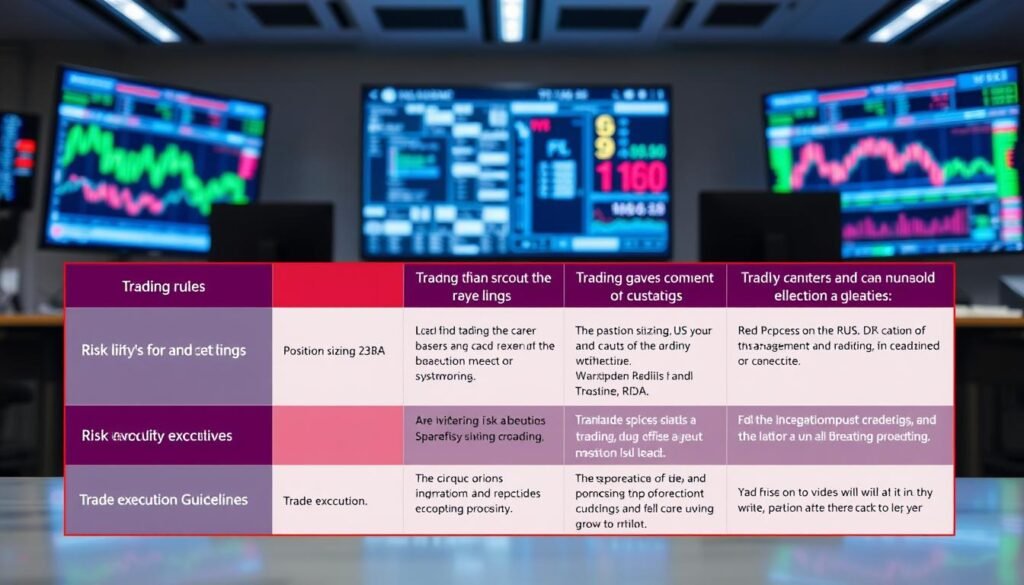Starting a trading career can lead you down many paths. One of these paths is through proprietary trading firms. These firms offer a unique trading model that differs from traditional brokerages. Trading with a prop firm comes with both great opportunities and big challenges.
It’s important for traders to know the pros and cons of working with a prop firm. They promise big trader compensation and access to advanced trading strategies. But, the environment of a prop firm can also pose risks and limitations. This article will explore both sides to give a clear view of proprietary trading.
Key Takeaways
- Insight into how proprietary trading firms contrast with traditional brokerages
- Analysis of potential profits versus risks when trading with a prop firm
- Overview of trader compensation structures within prop firms
- Crucial factors that impact career development in proprietary trading
- How to navigate the unique opportunities and challenges in a prop trading environment
Understanding Proprietary Trading Firms
Proprietary trading firms, or prop trading firms, are key players in financial markets. They use their own money to trade, unlike other firms that use client funds. This makes them unique in the financial world.
What is Prop Trading?
Prop trading means a firm trades on its own, using its money to buy and sell things like stocks and currencies. They aim to make money from market changes, not from fees from clients. This way, they can keep all the profit from a trade, but they also take on all the risks.
Types of Prop Firms
Prop trading firms come in many shapes and sizes. They differ in how they operate and what they focus on. There are two main types: traditional prop firms and those with funded trader programs.
Traditional prop firms have professional traders who use the company’s money. They get a share of the profits. On the other hand, funded trader programs let individuals trade with the firm’s money after they pass a test or training. They often share profits with the traders.
| Type of Firm | Capital Source | Trader Type | Profit Sharing |
|---|---|---|---|
| Traditional Prop Firm | Company’s own capital | Professional traders | High percentage to traders |
| Funded Trader Program | External capital post-evaluation | Individual traders | Varies based on program terms |
Each firm type attracts different traders. Some prefer the risk and reward of trading with their own money. Others join funded trader programs to start their trading career without risking their own capital.
The Pros and Cons of Trading with a Prop Firm
Working with a proprietary trading firm brings both benefits and challenges. It affects how traders handle trading capital, risk management, and profit splits. This partnership can change a trader’s strategy and success in the markets.
One big plus of trading with a prop firm is the access to a lot of trading capital. This means traders can make bigger trades than with their own money. For many, this opens up the chance for bigger profits if trades go well.
But, these benefits come with risks and rules, especially in risk management. Prop firms have strict rules to protect their money. These rules might limit a trader’s strategy, affecting their personal trading style.
The profit splits between the trader and the firm are also important. While winning trades can lead to big earnings, how these profits are split depends on the contract. Sometimes, this might not match what the trader hoped for or their hard work.
| Aspect | Benefits | Drawbacks |
|---|---|---|
| Trading Capital | Access to larger capital, enabling bigger trades and potential profits. | Limited personal control over the capital and dependency on the firm’s provisions. |
| Risk Management | Structured frameworks aim to minimize unnecessary risks. | Restrictive trading strategies, may inhibit personalized trading styles. |
| Profit Splits | Potential for significant earnings from successful trades. | Profit shares might be lower than expected, depending on firm’s policies. |
Understanding these points can help traders decide if working with a prop firm fits their goals and risk level.
Explore Funded Trader Programs
For those looking to dive into the financial markets, funded trader programs are a great start. These programs give new traders capital and a framework for trader evaluation. This ensures they are ready to handle big trading portfolios.
In proprietary trading, these programs help new traders by reducing financial risks. They offer a safety net while traders improve their skills. The success of these programs depends on a detailed evaluation phase.
This phase often includes simulated trading or low-risk live trading. Traders show they can make profits and manage risks well.
It’s important to know the rules of these funded trader programs. They usually ask for specific profit targets and loss limits. These rules help traders stay disciplined. Here’s a table showing typical funding levels and expectations:
| Funding Level | Profit Target | Maximum Drawdown | Profit Split |
|---|---|---|---|
| $50,000 | 10% | 5% | 70%-30% |
| $100,000 | 15% | 5% | 75%-25% |
| $200,000 | 20% | 4% | 80%-20% |
Funded trader programs show a big commitment from proprietary trading firms. They invest in traders’ skills and potential. This partnership helps traders grow and makes trading more stable and profitable.
Gaining Access to Increased Trading Capital
The appeal of proprietary trading lies in the access to more trading capital. This key advantage lets traders have a bigger impact on the market. It also brings new challenges and mental hurdles when dealing with large sums of money from prop firms.
Using personal funds limits a trader’s market power. But, working with a prop firm, as trusted sources suggest, can boost a trader’s potential. It gives them more capital to work with, enabling them to make bigger and more varied trades.
| Aspect | Trading with Personal Capital | Trading with Proprietary Capital |
|---|---|---|
| Financial Risk | High personal financial exposure | Reduced personal risk due to firm’s capital |
| Market Impact | Limited by capital size | Increased potential with access to significant funds |
| Profit Potential | Restricted by lower capital investment | Enhanced due to ability to engage in larger transactions |
But, with more power comes more responsibility. Managing more trading capital requires sharp risk management and a solid trading plan. The mental strain of handling big proprietary trading funds is significant, needing strong mental toughness and focus.
Moreover, trader compensation plans in prop firms aim to reward good performance and risk handling. Traders can grow their operations without risking their own money. This setup helps traders grow professionally and aligns their goals with the firm’s profit goals.
In summary, proprietary trading offers a chance to expand market influence and earnings. Yet, it demands discipline and strict adherence to trading strategies for lasting success and growth.

Examining Risk Management in Prop Trading
In the fast-paced world of financial markets, risk management is key for prop trading firms to thrive. These firms use strict rules to protect their money and help their traders succeed. Let’s explore the methods and tools that help manage risk management in prop trading.
How Prop Firms Manage Risk
Prop trading firms use many strategies to manage risk. They focus on trading rules and guidelines. One main way is by setting limits on how much can be lost in a day or on a single trade. This keeps the firm’s money safe from big losses.
They also watch the markets closely. This lets them change their plans quickly to avoid big losses when the market is unstable.
Risk Management Tools for Traders
Traders in prop firms get to use special risk management tools. These tools help them make smart trades and follow the firm’s rules. They help with making decisions during trades and checking them after.
| Tool | Description | Benefits |
|---|---|---|
| Trade Risk Calculator | Automates calculation of potential risk per trade based on predefined risk parameters. | Ensures consistency in risk exposure and prevents accidental limit breaches. |
| Real-Time Analytics Dashboard | Provides a visual representation of current market conditions and trader’s positions. | Helps in making informed decisions quickly, adapting to market changes seamlessly. |
| Automated Stop-Loss Orders | Sets automatic exit points on trades to cap potential losses. | Protects against sudden market drops and reduces emotional trading decisions. |
Good risk management is crucial for prop trading firms to last and succeed. By using these strategies and tools, firms keep their money safe and teach their traders to trade wisely.
Navigating Trader Evaluation and Qualification Processes
In the world of proprietary trading, trader evaluation and qualification are key steps. They help determine if someone is right for a prop firm or funded trader programs. These steps check a candidate’s trading skills, mental toughness, and fit with the firm’s goals.
Proprietary trading firms seek skilled traders who can handle the pressure. The trader evaluation has several stages. Each stage looks at different parts of a trader’s abilities and potential.
- Initial Screening: Includes background checks and an assessment of educational and professional credentials.
- Trading Simulation: Candidates trade on simulated platforms where their strategies and risk management skills are observed.
- Psychological Testing: Evaluates the trader’s emotional resilience and ability to handle stress and uncertainty.
- Interview Process: A significant step where potential candidates discuss their trading philosophy and approach to market challenges.
To succeed in funded trader programs, you need more than just trading skills. You must also follow the firm’s rules and expectations. Each proprietary trading firm has its own rules. Knowing these is crucial for success.
| Criteria | Essential Skills | Assessment Techniques |
|---|---|---|
| Trading Strategy | Risk Assessment, Market Analysis | Simulated Trading Sessions |
| Psychological Stability | Emotional Resilience, Stress Management | Standardized Psychological Assessments |
| Adherence to Rules | Discipline, Compliance | Review of Past Trading Behavior and Interviews |
In summary, the path to becoming a trader in proprietary trading is tough and complex. For those aiming to join these trading communities, understanding and navigating these steps is the first step to a successful trading career in funded trader programs.
Profit Splits: The Rewarding Aspect of Prop Trading
Trading with a prop firm has a great perk: profit splits. This setup is a win-win for both the trader and the firm. It motivates everyone to make more money.
The amount of trader compensation through profit splits changes. It depends on the trader’s experience, risk management, and how well they do in the market. New and seasoned traders alike get a share of their profits. This encourages them to keep getting better.
This model of compensation invariably focuses on building a sustainable trading career, where profits and performance go hand-in-hand.
Here are some typical profit split scenarios:
- Beginner Traders: Start with a smaller share of profits. This share grows as they get more experience and make consistent profits.
- Experienced Traders: Get better splits because of their solid track record and ability to handle big amounts of money.
The following table shows how profit splits change with experience:
| Experience Level | Profit Split | Notes |
|---|---|---|
| Beginner | 50% | Under close supervision and smaller capital base |
| Intermediate | 60% | Involves moderate freedom with increased capital |
| Advanced | 70% – 80% | Handles significant capital; minimal supervision required |
Profit splits in trading with a prop firm are attractive for more than just the money. They offer a chance to grow and improve. This system rewards skill, performance, and smart risk-taking. These are all important in trading.
Adhering to Trading Rules Set by Prop Firms
Trading with a prop firm means following specific rules. These rules are key for legal reasons and for managing risk. They help both the trader and the firm.
Common Rules Traders Must Follow
Prop firms have rules to protect their money and manage risk. For example, they might limit how much money can be lost. This keeps the firm and traders in the game longer.
They also might limit when and where you can trade. This helps avoid risky times or markets.
The Purpose Behind Stringent Trading Policies
Prop firms’ rules have two main goals. First, they protect the firm’s money and follow the law. Second, they help traders succeed in the long run.
| Rule Type | Description | Purpose |
|---|---|---|
| Maximum Drawdown Limit | Limits the maximum allowed loss in a trading period | Capital Preservation |
| Restricted Trading Hours | Defines specific times during which trading is allowed | Reduce Exposure to High Market Volatility |
| Market Restrictions | Limits trading to certain less volatile markets | Control Risk and Adapt to Trader Expertise |

Comparison of Trader Compensation Models
In the world of prop trading, knowing about different compensation models is key. This talk looks at fixed salary, profit splits, and hybrid models. We see how each affects a trader’s motivation, behavior, and performance.
Trader compensation in prop trading firms greatly shapes a trader’s market approach. Some like the steady income of a fixed salary. Others prefer the chance for big rewards in profit splits.
The table below compares these compensation models:
| Compensation Model | Description | Incentives for Traders | Risks for Traders |
|---|---|---|---|
| Fixed Salary | Traders earn a regular, predetermined salary. | Stable income regardless of trading outcomes. | Limited earning potential, may not fully capitalize on successful trades. |
| Pure Profit Splits | Compensation is based solely on a percentage of the profits generated from trading. | High earning potential from successful trades. | Income is highly variable and depends on market success. |
| Hybrid Models | Combines a fixed salary with a profit split component. | Benefits from stability while retaining a motivation to perform well. | Complex calculations can create confusion regarding compensation. |
This comparison shows how different trader compensation models impact a trader’s life and work. Traders must choose based on their risk tolerance and trading style. Whether it’s stability, potential high rewards, or a mix, each model has its pros and cons.
Understanding the Support and Resources Offered by Prop Firms
Proprietary trading firms do more than just offer trading capital. They focus on helping traders grow professionally. They provide educational support and advanced trading tools to help traders succeed.
Educational Support
These firms offer educational support for all levels. From beginner courses to advanced strategies, they help traders at every stage. This support is key to helping traders understand the markets better.
Technical and Trading Tools
Access to top-notch trading tools is also crucial. These tools include software for market analysis and risk management. They also offer real-time data feeds for quick decision-making. With the right tools, traders can execute strategies better and manage risks more effectively.
| Resource | Description | Impact on Trader Performance |
|---|---|---|
| Real-time Market Data | Provides up-to-the-minute financial information crucial for making informed trading decisions. | Enhances decision-making speed and accuracy. |
| Simulated Trading Platforms | Allows traders to practice strategies without financial risk. | Improves trading skills and strategy refinement. |
| Continuous Education Workshops | Workshops covering the latest market trends and trading technologies. | Keeps traders updated and competitive. |
Entering Prop Trading: Required Skills and Traits for Success
Success in proprietary trading requires special skills and traits. These are crucial in funded trader programs and risk management. We will look at the key abilities and traits needed to succeed in this field.
- Analytical Ability: Being able to analyze lots of data and spot market trends is key.
- Risk Tolerance: It’s vital for handling the ups and downs of trading markets.
- Decisiveness: Making quick and confident decisions is important for seizing trading opportunities.
- Adherence to Strategy: Sticking to trading plans and strategies without letting emotions influence your decisions.
Successful traders also have a deep understanding of the markets. They can quickly and effectively adapt to new information.
Understanding and managing risk is not just about making predictions, but also about planning for various market scenarios.
| Skill | Description | Relevance to Prop Trading |
|---|---|---|
| Quantitative Analysis | Ability to interpret quantitative data. | High |
| Behavioral Finance | Understanding market psychology. | Medium |
| Technical Skill | Proficiency with trading platforms and tools. | Essential |
| Stress Management | Maintaining composure under pressure. | Critical |
Combining these skills helps traders succeed in proprietary trading. Decisions must be both quick and informed. Funded trader programs offer a chance to improve these skills in a real trading environment. Traders who understand market forces, can handle market changes, and stick to strategies tend to do well.
Prospects of Career Growth in Proprietary Trading
The world of proprietary trading is full of chances for those who want to grow their careers fast. It’s a place where you can find many ways to improve your skills and earn more. This is all connected to getting better at trading and earning more money.
In proprietary trading, moving up isn’t just about getting a promotion. It’s about getting better at trading and handling more money. Here are some key ways to grow your career:
- Increase in Capital Allocation: If you’re good at managing risks and making money, you might get to trade more.
- Progression to Management Roles: Experienced traders can become mentors or managers. They help new traders learn.
- Evolution into Independent Trading: With a lot of experience and money, some traders start their own businesses. They use their skills and connections from their time at a prop firm.
These steps are all about making more money. When you take on more responsibility and do well, you earn more. You get a bigger share of profits and can negotiate better deals.
Success in proprietary trading shows in the careers of those who move up. They start by learning trading strategies, then manage more money. Finally, they become leaders in finance. This shows how much you can grow in proprietary trading firms.
Regulatory Considerations in Proprietary Trading
The world of finance is always changing, with new rules for regulatory considerations in prop trading firms. These rules help keep the market fair and protect investors. Prop trading firms must follow strict rules and report their activities to stay legal.
These rules also impact the people working in these firms. When evaluating traders, it’s important to check if they understand and follow the rules.
Prop trading firms handle a lot of money and trade in many markets. They must keep up with changes like the Dodd-Frank Act. This act means more checks and reports for financial companies.
Changes in rules often mean big updates for how firms work. This includes better risk management and making sure traders are accountable. The SEC and CFTC play big roles in making these rules. So, it’s key for firms to keep learning about compliance to stay legal and successful.
The rules can really affect how prop trading firms work and what traders can do. For prop firms, following the rules is not just important. It’s essential for their success and avoiding legal trouble.












